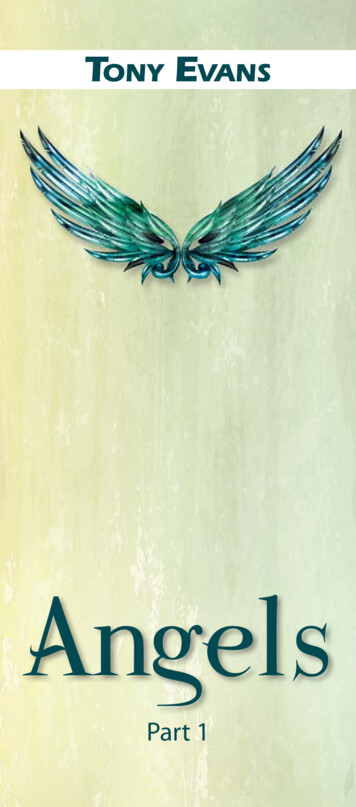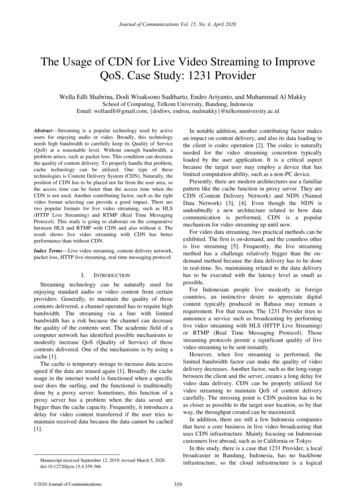
Transcription
73Angels Explained by KidsI only know the names of two angels. Hark and Harold. Gregory, 5Everybody’s got it all wrong. Angels don’t wear halos anymore. I forget why, but scientistsare working on it. Olive, 9It’s not easy to become an angel! First, you have to die. Then you go to heaven, then there’sstill the flight training to go through. And then you got to agree to wear those angel clothes.Matthew, 9Angels work for God and watch over kids when God has to do something else. Mitchell, 7My guardian angel helps me with math, but he’s not much good for science. Henry. 8Angels don’t eat, but they drink milk from holy cows. Jack, 6Angels talk all the way while they’re flying you up to heaven. The basic message is where youwent wrong before you got dead. Daniel, 9When an angel gets mad, he takes a deep breath and counts to ten. And when he lets out hisbreath, somewhere there’s a tornado. Reagan, 10Angels have a lot to do and they keep very busy. If you lose a tooth, an angel comes in throughyour window and leaves money under your pillow. Then when it gets cold, angels go north forthe winter. Sara, 6Angels live in cloud houses made by God and His Son, who’s a very good carpenter. Jared, 8All angels are girls because they gotta wear dresses and boys didn’t go for it. Antonio, 9My angel is my grandma who died last year. She got a big head start on helping me while shewas still down here on earth. Katelynn, 9Some of the angels are in charge of helping heal sick animals and pets. And if they don’t makethe animals get better, they help the kid get over it. Vicki, 8What I don’t get about angels is why, when someone is in love, they shoot arrows at them. Sarah, 7
Angelogy74The Study of AngelsI. The Existence of Angels“Throughout his long history, man has often wondered whether he is indeedthe only intelligent being in his universe, and whether life as we know it is confined to the earth alone. Is there intelligent life in the universe? Are there otherliving and rational creatures ‘out there’ besides man? There are indeed. Are theyfriend or foe? They are both. Is their ‘civilization’ older than ours? It is. Willwe ever learn to communicate with them? We not only will, but a number of human beings already have met and talked with them. Who are these cosmic creatures? They are called angels.” Willmington p. 775Angels are mentioned in books of the Bible, times in the O.T.and times in the N.T., for a total of times. They are not justmythological creatures, childish fables, or primitive superstitions. Angels are asas mankind, although, obviously, not visible.Some common misconceptions about angels:When people die, they become angels.There are baby angels, as well as adult angels.Angels always have two wings.The number of angels is constantly changing.Angels are always good, and do good things for us.Where did angels come from? Why do they exist? How do they affectmankind? What are they really like?II. The Origin of AngelsHow: Angels are beings (Ps. 148:2,5; Col. 1:16).How many: The number of angels is a number forever. Angels donot themselves (Mt. 22:30) and they cannot(Lk. 20:34-36).There are an number of angels (Rev. 5:11).When: Prior to the creation of the (Job 38:1,4,7).Why: To God (Col. 1:16; Heb. 1:6).
III. The Nature of Angels751. They are beings (Heb. 1:13, 14).Note: Just because they are spirits, doesn’t mean they don’t have some typeof ! Although a spirit does not have and(Lk. 24:39), according to 1 Cor. 15:40, 44, there are“spiritual .” And notice how an angel was able to wakePeter by him in the side (Acts 12:7).2. They are beings (2 Kings. 6:15-17).Note: Although angels will on occasion reveal themselves to men, their normal practice is to remain . One reason for this is to preventmen from them (Col. 2:18; Rev. 22:8,9).3. They are .I.e. They possess a (Dan. 9:21, 22; 2 Cor. 11:3),a (Lk. 8:30-32; 2 Tim. 2:26; Jude 6; Isa. 14:12-15), and(Job 38:7; Lk 2:13; James 2:19; 1 Pet. 1:12; Rev. 12:17).4. They are (presently) to men (Heb. 2:6, 7), but somedaywill be by men (1 Cor. 6:3).5. They are, and always will be to God. They are not (Dan. 10:12). They are not (Dan. 10:13; Jude 9). They are not (Mt. 24:36; 1 Pet. 1:12).6. There are various among angels (Eph. 3:10; 6:12). The Archangel Michael (Jude 9; 1 Thess. 4:16).Chief Princes Michael and perhaps Gabriel (Dan. 10:13).Princes Demon over Persia, etc. (Dan. 10:13; Eph. 2:2).Various Rulership Positions rulers, powers, authorities (Eph. 1:21;6:12).Cherubim Guardians of God’s holiness (Gen. 3:24; see also Ez. 28:14,16).Seraphim Attendants at God’s throne (Isa. 6:2, 6).
IV. The Ministries of Angels76In Heaven1. To God (Isa. 6:1-3; Rev. 5:11-14).2. To God (Psa. 103:20, 21; Rev. 8-10)On Earth1. Toward Believers: They inform us of God’s (Mt. 1:20; Gal. 3:19; Heb. 2:2). They bring answers to (Dan. 10:5, 6, 11, 12; Acts 12:5-10). They and us(Mt. 4:11; Acts 27:22-25). They us from harm (Ps. 34:7; 91:11; 2 Kings. 6:15-17; Mt.2:13-15). They us from harm (Acts 5:19; 12:7) They watch us and from us (1 Cor. 11:10; Eph. 3:8-10; 1Pet. 1:12). They carry out God’s (Mt. 28:1,2,5,6). They us (Heb. 1:14). They us at the time of death (Lk. 16:22).2. Toward Unbelievers: They aid in winning people to (Acts 8:26; 10:1-8). They carry out God’s (2 Kings. 19:35;Acts 12:21-23; Rev. 8:2; 12:7-10; 14:9-11).
Angel EnvyIPhilip Yancey; Christianity Today: July 17, 199577f the national bestseller lists are any guide, I may be the only person in America who has not reada book about angels. Moreover, I do not own a single stuffed angel or lapel pin angel. In truth,our culture’s fascination with angels mystifies me, especially since the cuddly curios stocked in gift storesbear such faint resemblance to the majestic, terrifying beings described in the Bible. (Ever wonder why “Fearnot” were usually the first words out of an angel’s mouth?)I do recall a childhood envy of angels, though. No fingers to catch in car doors, the ability to scarepeople at will, the magic of invisibility-angels seem blessed with wondrous, Kryptonic powers. Even now, insober adulthood, a trace of that envy lingers. Angels never get cancer, never lose their jobs and go hungry;never having fallen, they have no apparent need for redemption. In contrast, humans seem frail and vulnerable. We were created, said the psalmist, “a little lower than the angels,” and life gives us daily reminders.Being human is hazardous to our health.Perhaps for this reason a wistful stream of “angelism” has flowed through church history. When Iread the mystical works of Jerome or John of the Cross or Michael Molinos, I sense a nagging resentmentagainst the constraints of humanity. James Agee once described a human being as “A furious angel nailed tothe ground by his wings,” and I detect some of that fury in the Christian ascetics- and also in contemporaryevangelicalism’s discomfort with the body. We’d just as soon be angels, thank you; the body strikes us as akind of prison.n an astonishing inversion of rank, the author of Hebrews defines the role of angels this way: “Arenot all angels ministering spirits sent to serve those who will inherit salvation?” These creaturesbefore whom great saints fell to the ground aquiver are actually our servants. Even Hollywood seems captivated by that notion: in It’s a Wonderful Life, for example, the apprentice angle Clarence helps restore hopeand self-worth to a man on the verge of suicide.Two of German director Wim Wender’s films (Wings of Desire and Faraway, So Close) cover thesame ground in more detail. These angels move in a parallel universe from which, unseen, they reach acrossto offer human beings mild assistance. An angel who sits beside a young man on a ledge may caress him andsubliminally soothe him, but may not prevent him from jumping off the ledge. In an interesting twist, afteryears of accompanying people, with all their joys and sorrows, some of these angels choose to descend andjoin them.Why would an angel choose to become a human being? In Wender’s view-much of his philosophycomes through the mouth of Peter Falk, the most incongruous angel in cinematic history-angels grow attracted to materiality. An angel wonders what it would be like to hold an apple, or feel hot coffee sliding downhis throat. He wants to feel newspaper print rubbing off on his hand, to trip someone who steps on his foot,to feel a skeleton moving inside as he walks. He wants to fall in love. He wants to feel now instead of justforever, to experience time in discrete packets of days, hours, minutes, just as people do.Wender’s angelology is fanciful, of course, and yet the New Testament contains intriguing hints thatbeing human has its advantages, which even an angel must acknowledge.“We have been made a spectacle to the whole universe, to angels as well as men,” Paul told the Corinthians (1 Cor. 4:9). A bit later in the same letter he gave a startling glimpse of the future: “Do you notknow that we will judge angels?” (6:3). The apostle Peter, speaking of the mysteries of God’s plan of redemption, said rather breathlessly, “Even angels long to look into these things” (1 Pet. 1:12)I hardly know what to make of these passages, which give mere hints and leave many blanks unfilled. It seems, though, that inexplicably God has chosen to invest the future not in angels but in us. Wehumans, frail and subject to death, prone to temptation, notoriously inconsistant, feckless and forgetful atworship, we “the scum and glory of the universe,” in Pascal’s phrase, have a central role to play in the reclaiming of the cosmos.respect and admire angels, but I no longer envy them as I did in childhood. I can find no clearindication in the Bible how God feels about angels. Yet I do know how He feels about humanbeings: for some incomprehensible reason, He loves us. A familiar passage in Romans provocatively bringsthe two creations together:For I am convinced that neither death nor life, neither angels nor demons, neither the present nor thefuture, nor any powers, neither height nor depth, nor anything else in all creation, will be able to separate us from the love of God that is in Christ Jesus our Lord. (Rom. 8:38-39, NIV)Could it be that angels wear lapel pins and collect stuffed representations of human beings?II
sober adulthood, a trace of that envy lingers. Angels never get cancer, never lose their jobs and go hungry; never having fallen, they have no apparent need for redemption. In contrast, humans seem frail and vulnera-ble. We were created, said the psalmist, "a little lower than the angels," and life gives us daily reminders.










